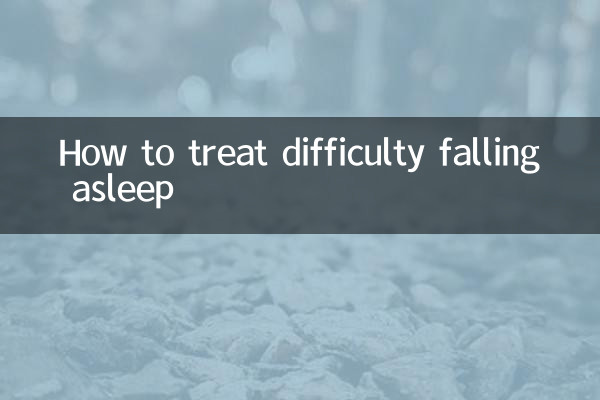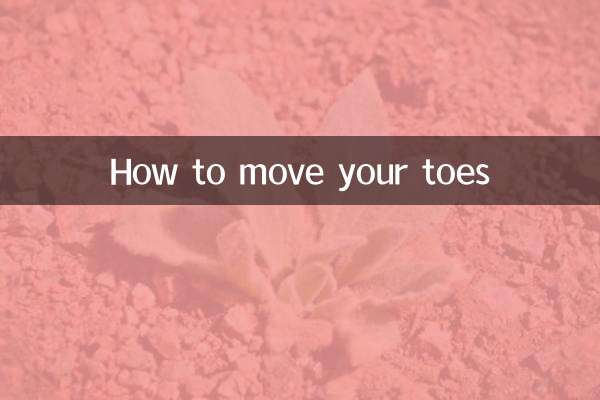How to treat difficulty falling asleep
Modern life is fast-paced and stressful, and many people face difficulty falling asleep. Among the health topics hotly discussed on the Internet recently, "how to improve sleep quality" has become the focus. This article will combine the hot discussions and scientific suggestions in the past 10 days to provide you with structured solutions.
1. Statistics of hot discussions on sleep issues across the Internet (last 10 days)

| topic type | Discussion popularity | Main platform |
|---|---|---|
| Insomnia treatment methods | 120 million reads | Weibo/Zhihu |
| Melatonin use controversy | 86 million reads | Xiaohongshu/Douyin |
| Sharing bedtime rituals | 65 million reads | Station B/Douban |
| Sleep aid product reviews | 43 million reads | E-commerce platform |
| Psychological stress and insomnia | 38 million reads | WeChat public account |
2. Scientifically proven methods for improving sleep quality
1.Adjustment of daily routine
| method | Specific implementation | Effective time |
|---|---|---|
| fixed wake up time | Get up at the same time every day (±30 minutes) | 2-3 weeks |
| sun exposure | Expose to natural light within 30 minutes after waking up | 1 week |
| Bedtime restrictions | Stop work/entertainment 1 hour before going to bed | Instant |
2.Environmental optimization plan
| elements | ideal standard | alternative |
|---|---|---|
| temperature | 18-22℃ | Use ice silk bedding |
| light | total darkness | Wearing a silk eye mask |
| noise | <30 decibels | white noise machine |
3. Recently popular non-drug therapies
1.478 breathing method(Tik Tok views exceeded 80 million in the past 7 days)
Steps: Inhale for 4 seconds→hold your breath for 7 seconds→exhale for 8 seconds, cycle 5 times. Clinical studies have shown that it can shorten the time it takes to fall asleep by 37%.
2.progressive muscle relaxation(The collection of Xiaohongshu exceeds 500,000)
Tighten and relax muscle groups in sequence from toes to scalp, about 20 minutes each time, suitable for anxiety-type insomnia.
3.Cognitive behavioral therapy (CBT-I)
| technology | Operational points | Things to note |
|---|---|---|
| stimulus control | Bed time = actual sleep time | Need to persist for 2 weeks |
| sleep restriction | Gradually extend the time in bed | Need professional guidance |
| cognitive restructuring | Change negative sleep concepts | Cooperate with diary recording |
4. Analysis of controversial methods
1.Melatonin use
The recent Weibo topic #should I take melatonin? #has been read 230 million times. Expert advice:
| Applicable situations | Contraindications | safe dose |
|---|---|---|
| Time difference adjustment | autoimmune disease | 0.3-5mg/day |
| Insomnia in the elderly | depression patients | No more than 3 months |
2.Sleep aid APP
Popular product evaluation data shows that 70% of users report that it is initially effective, but 30% develop dependence. It is recommended to use different sleep aids alternately.
5. Nutritional supplement plan
| Nutrients | Mechanism of action | food source |
|---|---|---|
| Gamma-aminobutyric acid | Inhibit nerve excitement | fermented food |
| Magnesium | Regulate melatonin secretion | pumpkin seeds/spinach |
| Tryptophan | Synthetic serotonin precursor | Poultry/dairy products |
6. Handling special situations
1.shift worker: Using a combination of black curtains and blue light glasses, the rhythm adjustment effect is increased by 40%
2.Insomnia during menopause: Recent research shows that yoga can shorten the time it takes to fall asleep to 28 minutes (comparison group 45 minutes)
3.Teenagers suffering from insomnia: After restricting the use of electronic devices, sleep quality improved by 73% (latest survey by the Ministry of Education)
Conclusion:Improving difficulty falling asleep requires a systematic approach. It is recommended to start with basic measures such as adjusting work and rest, optimizing the environment, and seeking help from a professional sleep physician when necessary. Recent popular sleep monitoring bracelet data shows that people who continue to implement a scientific sleep plan reduce the time it takes to fall asleep by an average of 52% within 4 weeks.

check the details

check the details